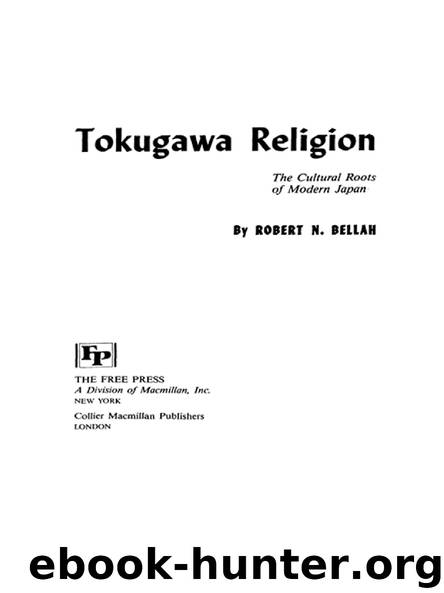Tokugawa Religion by Robert N. Bellah

Author:Robert N. Bellah
Language: eng
Format: epub
Tags: SOC035000
Publisher: The Free Press
Published: 1957-07-15T00:00:00+00:00
Economic Ethic of the Merchant Class
The economic ethic of the merchant class as reflected in and influenced by the Shingaku movement will be the subject of the next chapter. This section, then, will be confined to general remarks and to a discussion of the influence of Jōdo Shinshū on one section of the merchant class, the Ōmi merchants, a subject carefully studied by Naitō Kanji.
The Jōdo Shinshū was widely disseminated among the common people of Japan, both farmers and towndwellers, so that it is likely that the implications discovered by Naitō of this ethic for the Ōmi merchants were fairly general. This is a problem for further research.
In Chapter III some background of the early period of this sect has been given and Rennyo Shōnin (1415-1499), the so-called second founder of the sect, was mentioned. Rennyo is chiefly of interest to us because of the fact that he made important advances with respect to the religious ethical regulation of everyday life. For Rennyo occupational life was like food and clothing, indispensable to the religious life, but still something alien to it. The fervor for the “other shore” took precedence for him over any everyday concern. Nevertheless, his view of the occupational life as integrated with the religious life is shown by his remark that, “If we engage in business, we must realize that it is in the service of Buddhism.” 21 His stress on on and his inner-worldly asceticism are revealed in the following description:
Although in the midst of poverty, he always felt grateful to Amida Nyorai, by whose grace he believed that he was living. Whenever he sat down to dinner, he would say, “how happy I am to be able to take this meal, while there are so many in the world starving without anything to eat.” He would then express, his hands clasped, his heartfelt gratitude in reciting Amida’s Holy Name. He always told his family members and followers not to waste anything necessary for everyday life, because by doing so one would commit a sacrilege to creation. Once he found a piece of paper thrown away in the hallway. He picked it up and, reverently, raising it before his forehead, observed with a sigh, “How can they be so sinful as to waste what has been given in blessing!” 22
In the early period Shinshū stressed salvation by faith alone and paid little attention, relatively, to ethical demands. The early literature is full of statements that anyone can be saved no matter how wicked. Rennyo raises the ethical demand to a very important place in Shin thought but it remains something separate from the religious demand. By middle Tokugawa times, however, salvation and ethical action came to be indissolubly linked. No more was heard about the wicked being saved. Ethical action had become the very sign of salvation. The following is a quote from a Shinshū tract of the period:
A person who lacks faith can easily do unreasonable evil deeds. Therefore, although he should not expect the
Download
This site does not store any files on its server. We only index and link to content provided by other sites. Please contact the content providers to delete copyright contents if any and email us, we'll remove relevant links or contents immediately.
| Arms Control | Diplomacy |
| Security | Trades & Tariffs |
| Treaties | African |
| Asian | Australian & Oceanian |
| Canadian | Caribbean & Latin American |
| European | Middle Eastern |
| Russian & Former Soviet Union |
The Secret History by Donna Tartt(19046)
The Social Justice Warrior Handbook by Lisa De Pasquale(12185)
Thirteen Reasons Why by Jay Asher(8889)
This Is How You Lose Her by Junot Diaz(6875)
Weapons of Math Destruction by Cathy O'Neil(6264)
Zero to One by Peter Thiel(5786)
Beartown by Fredrik Backman(5737)
The Myth of the Strong Leader by Archie Brown(5496)
The Fire Next Time by James Baldwin(5429)
How Democracies Die by Steven Levitsky & Daniel Ziblatt(5213)
Promise Me, Dad by Joe Biden(5141)
Stone's Rules by Roger Stone(5080)
A Higher Loyalty: Truth, Lies, and Leadership by James Comey(4950)
100 Deadly Skills by Clint Emerson(4919)
Rise and Kill First by Ronen Bergman(4778)
Secrecy World by Jake Bernstein(4740)
The David Icke Guide to the Global Conspiracy (and how to end it) by David Icke(4699)
The Farm by Tom Rob Smith(4502)
The Doomsday Machine by Daniel Ellsberg(4484)
